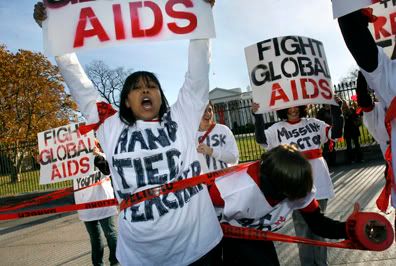
Are we spending too much of our limited health care dollars on AIDS? I am not advocating that AIDS is not a big problem. This is especially true on the African Continent. However, when the Mainstream Media, Hollywood and several very loud activists groups hype an issue for years, we can lose our perspective. We should spend our dollars where we can save the most lives. Instead, we spend disproportionate amounts on the "issue of the day."
Global AIDS crisis overblown? Some dare to say so
By MARIA CHENG – 1 day ago
LONDON (AP) — As World AIDS Day is marked on Monday, some experts are growing more outspoken in complaining that AIDS is eating up funding at the expense of more pressing health needs.
They argue that the world has entered a post-AIDS era in which the disease's spread has largely been curbed in much of the world, Africa excepted.
"AIDS is a terrible humanitarian tragedy, but it's just one of many terrible humanitarian tragedies," said Jeremy Shiffman, who studies health spending at Syracuse University.
Roger England of Health Systems Workshop, a think tank based in the Caribbean island of Grenada, goes further. He argues that UNAIDS, the U.N. agency leading the fight against the disease, has outlived its purpose and should be disbanded.
"The global HIV industry is too big and out of control. We have created a monster with too many vested interests and reputations at stake, ... too many relatively well paid HIV staff in affected countries, and too many rock stars with AIDS support as a fashion accessory," he wrote in the British Medical Journal in May.
Paul de Lay, a director at UNAIDS, disagrees. It's valid to question AIDS' place in the world's priorities, he says, but insists the turnaround is very recent and it would be wrong to think the epidemic is under control.
"We have an epidemic that has caused between 55 million and 60 million infections," de Lay said. "To suddenly pull the rug out from underneath that would be disastrous."
U.N. officials roughly estimate that about 33 million people worldwide have HIV, the virus that causes AIDS. Scientists say infections peaked in the late 1990s and are unlikely to spark big epidemics beyond Africa.
In developed countries, AIDS drugs have turned the once-fatal disease into a manageable illness...
Read more here.
No comments:
Post a Comment